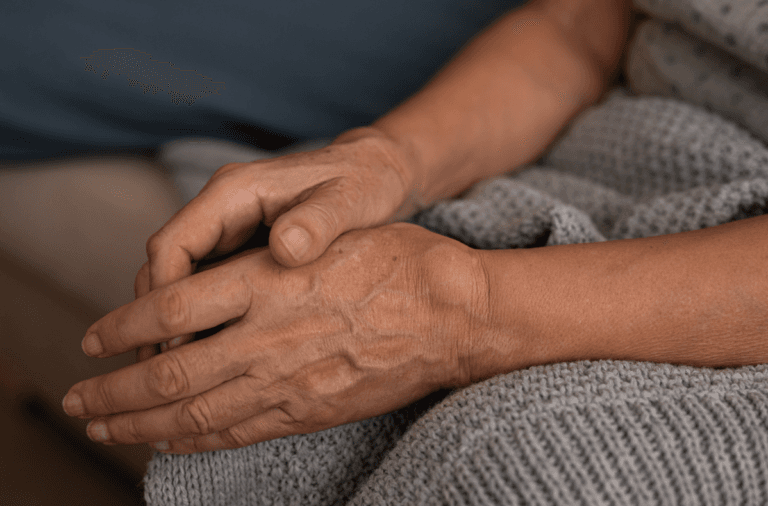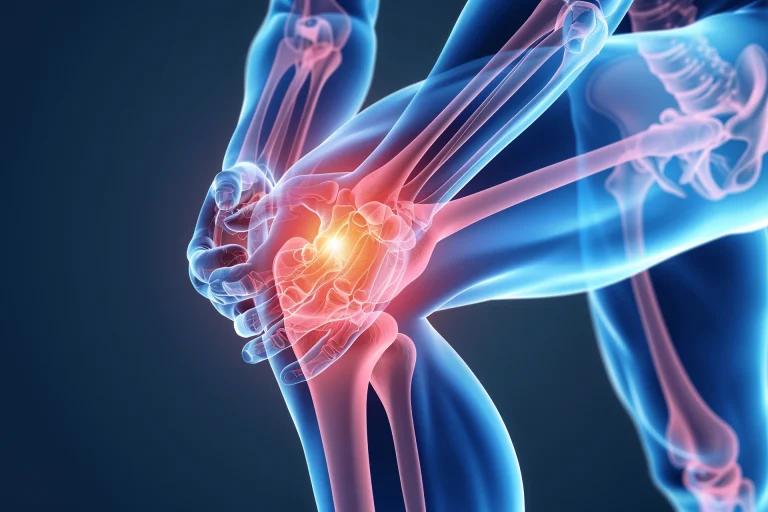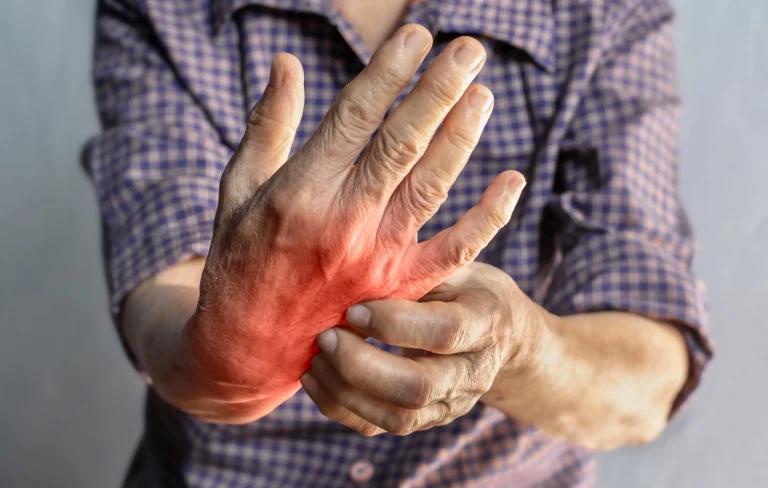
September 17, 2025 (Current Version)
March 28, 2025
Arthritis is a common condition that affects millions of people worldwide. It can cause pain, stiffness, and inflammation in the joints, making it difficult to perform daily activities in people of all ages. While there are different types of arthritis, the main cause remains unclear for many individuals.
Many people with arthritis wonder what the main cause of this condition is, so they can better understand their diagnosis and treatment options. In this blog post, we’ll delve into the types of arthritis, and its causes, and provide some useful information to help you manage your symptoms effectively.
Understanding Arthritis
Arthritis is a condition that affects the joints, causing pain, stiffness and decreased range of motion. It can be caused by various factors including age, autoimmune diseases and gout. The main cause of arthritis is the breakdown of cartilage in the joints which leads to inflammation and pain. Did you know that understanding the causes of arthritis can help individuals to prevent or manage symptoms through lifestyle changes, medication or other treatments recommended by healthcare professionals?
Chemicals such as cytokines can also contribute to arthritis development by damaging cells in the joint lining causing joint damage. Understanding the causes of arthritis can help individuals take steps to prevent or manage symptoms through lifestyle changes, medication or other treatments recommended by healthcare professionals.
What is Arthritis?
Arthritis is a condition that affects the joints, causing inflammation and pain. There are several common types of arthritis, including rheumatoid arthritis, osteoarthritis, gout, and psoriatic arthritis. The causes of each type vary but can include age-related wear and tear on the joints or autoimmune diseases.
Symptoms of arthritis can include joint pain and stiffness, swelling in the affected area, and difficulty moving the joint. Initially, you may be recommended ibuprofen for arthritis pain leading onto corticosteroids or disease-modifying antirheumatic drugs (DMARDs), which suppress your immune system to help improve symptoms. Your doctor may also need to refer you to a rheumatologist, who specialises in conditions that affect the joints. A proper diagnosis by a healthcare professional may involve blood tests, physical exams or imaging tests such as X-rays or MRIs to determine which type of arthritis is present. If left untreated, arthritis can lead to chronic pain and limited mobility.
Most common forms of arthritis
- Rheumatoid Arthritis
- Osteoarthritis
- Gout
- Psoriatic Arthritis
Symptoms
- Joint Pain
- Stiffness
- Swelling in affected areas
Diagnosis
- Blood tests
- Physical exam
- Imaging Tests (X-rays/MRIs)
Types of Arthritis
Arthritis is a condition that affects the joints, causing pain and inflammation. Osteoarthritis is the most common type of arthritis and occurs due to wear and tear of cartilage in joints over time. On the other hand, rheumatoid arthritis is an autoimmune disease where the body’s immune system attacks its joint tissues leading to inflammation. Psoriatic arthritis is another form of inflammatory arthritis that can occur in people with psoriasis, a skin condition characterised by red patches covered with white scales.
Osteoarthritis
Wear and tear on joints is a primary cause of osteoarthritis, which occurs when the cartilage covering bones in a joint gradually breaks down. This wear-and-tear damage can be exacerbated by injury or trauma to joint cartilage, leading to inflammation and pain. Additionally, genetic factors may increase an individual’s likelihood of developing osteoarthritis.
While there is no cure for osteoarthritis, treatments such as physical therapy and medications can help manage symptoms. Maintaining a healthy lifestyle with regular exercise and weight management may also decrease the risk of developing this condition. Early diagnosis and intervention are critical in managing the effects of arthritis on daily life.
Rheumatoid Arthritis
Rheumatoid Arthritis is an autoimmune disorder that affects millions of people worldwide. This condition occurs when the immune system mistakenly attacks healthy joint tissues, leading to inflammation and pain. While the exact cause of rheumatoid arthritis is unknown, environmental triggers such as smoking and exposure to pollution can increase the risk of developing this disease.
Family history also plays a significant role in developing rheumatoid arthritis. Studies have shown that individuals with a family history of this condition are more likely to develop it themselves. Therefore, if you have a family member who has been diagnosed with rheumatoid arthritis, it’s essential to speak with your doctor about your risk factors and ways to prevent or manage symptoms effectively.
Psoriatic Arthritis
Psoriatic arthritis is a condition typically associated with psoriasis, a skin disease that affects millions of people across the world. The immune system dysfunction present in psoriasis can also lead to inflammation and joint pain in various parts of the body, which is what characterises psoriatic arthritis. Additionally, there appears to be a genetic predisposition towards developing both conditions, indicating a possible link between psoriasis and arthritis that warrants further investigation.
It’s important for individuals diagnosed with either or both conditions to seek medical advice promptly as early diagnosis can help manage symptoms and prevent long-term damage to joints and other organs affected by these diseases. Treatment options may include lifestyle changes such as exercise programs or medications like nonsteroidal anti-inflammatory drugs (NSAIDs) or biologic agents depending on the severity of symptoms experienced by patients with this type of arthritis.
Causes of Arthritis
Arthritis, a disease characterised by joint inflammation and stiffness, has various causes. One of the leading factors contributing to arthritis is genetics. Certain genes can make individuals more susceptible to developing rheumatoid arthritis or osteoarthritis.
Another significant cause of arthritis is age. As people get older, their joints undergo wear and tear from daily use which can lead to degeneration and inflammation over time. Age-related changes also affect the composition of cartilage in joints, leading to an increased risk of developing arthritis.
Injury and overuse are other possible contributors to joint problems that may result in arthritis later in life. If you have experienced a previous injury or trauma at some point in your life, this damage could become aggravated with age and eventually develop into arthritic symptoms.
While uncommonly seen as a direct cause for adults suffering from arthritis; infections such as Lyme Disease can spread through the bloodstream causing swelling in joints which could lead up-to having arthritis too.
Finally, lifestyle choices like smoking cigarettes or consuming excessive amounts of alcohol have been linked with an increased risk for certain types of inflammatory arthritis such as rheumatoid arthritis (RA). These unhealthy habits contribute significantly towards weakening bones thus increasing susceptibility towards bone diseases like osteoporosis, which becomes another big reason behind arthritis, especially amongst women post-menopause.
Genetics
Family history, inherited genes, and gender play a crucial role in the development of arthritis. Arthritis often runs in families and can be passed down through generations due to certain genetic markers. Additionally, women are more likely to develop arthritis than men.
- Family history is a significant risk factor for developing arthritis
- Inherited genes can increase the likelihood of developing certain types of arthritis
- Women are more prone to developing many forms of arthritis compared to men
Age
Cartilage wear and tear over time is a natural process that occurs as we age. As we use our joints repeatedly, the cartilage can become damaged and less able to protect the bones from rubbing against each other. This can cause pain, stiffness, and inflammation in the affected joint.
Natural joint degeneration with age is also a common cause of arthritis. Over time, the body’s ability to repair damage to cartilage decreases, leading to further wear and tear on joints. This can result in conditions such as osteoarthritis or rheumatoid arthritis. While ageing is an inevitable part of life, taking steps to maintain joint health through regular exercise and proper nutrition can help slow down this natural degeneration process.
Injury and Overuse
Joint injuries from accidents or sports activities and repeated stress on joints from work-related activities are common causes of overuse injuries. Overuse injuries can lead to inflammation, pain, and eventually arthritis. Joint injury can cause cartilage damage. Cartilage normally cushions where the bones meet in a joint and helps reduce friction during movement. Repeatedly stressing a joint through work-related tasks or playing sports that require repetitive motions can also lead to inflammation and wear and tear on the joint. To prevent overuse injuries, it is important to stretch before physical activity, use proper form when lifting heavy objects at work, take breaks throughout the day if needed, and avoid repetitive movements whenever possible.
In addition to preventing overuse injuries that could potentially lead to arthritis in the future – avoid full-fat dairy products like milk cheese ice cream sour cream as well as butter; processed meats such as sausage hot dogs bacon etc., refined carbohydrates (including sweets), saturated fat consumption should be limited too – adopting lifestyle changes like exercising regularly will help keep your weight under control while reducing inflammation levels throughout your body which is another key factor towards preventing arthritis onset.
Infection
Bacterial or viral infections affecting the joints can cause arthritis. Infectious arthritis is caused by microorganisms such as bacteria, fungi, and viruses that spread through the bloodstream and infect a joint. Common symptoms include joint pain, swelling, redness, warmth in the affected area, fever, and chills.
Here are some common bacterial or viral infections that can affect the joints:
- Lyme disease
- Gonorrhea
- Staphylococcus aureus
- Streptococcus pneumoniae
- Hepatitis C virus
If you experience any of these symptoms or suspect an infection-related arthritis diagnosis for yourself or someone else promptly contact your doctor. Early treatment may help prevent further damage to your joints and improve overall outcomes.
Lifestyle Factors
Obesity and excess weight can be major contributing factor to joint pain and arthritis. The added weight puts strain on the joints, leading to wear and tear over time. Additionally, a poor diet lacking in nutrients needed for healthy joint function can also contribute to arthritis development. Avoiding obesity and maintaining a nutrient-rich diet are important steps in preventing joint pain and reducing the risk of developing arthritis later in life.
Conclusion
In conclusion, while the exact cause of arthritis is not fully understood, it is believed to be a combination of factors such as genetics and lifestyle choices. Studies have shown that maintaining a healthy weight, regular exercise and reducing stress can help prevent or manage symptoms of arthritis. Additionally, certain medications and therapies may also be effective in managing pain and inflammation associated with this condition. By taking proactive steps towards improving overall health and wellness, individuals can potentially reduce their risk or mitigate the impact of arthritis on their daily lives.
In summary, there are no simple answers when it comes to the main cause of arthritis. However, by staying informed about current research developments and working closely with healthcare professionals to develop an individualized treatment plan based on one’s own unique needs and circumstances; those affected by this condition can take control over their health outcomes for a better quality of life. Ultimately, making small but meaningful changes in daily routines can go a long way towards living well despite any challenges posed by arthritis.
Sources
- Living with arthritis – NHS
- Overview of Arthritis – NIH
- Arthritis basics – CDC
Medical Disclaimer
NowPatient has taken all reasonable steps to ensure that all material is factually accurate, complete, and current. However, the knowledge and experience of a qualified healthcare professional should always be sought after instead of using the information on this page. Before taking any drug, you should always speak to your doctor or another qualified healthcare provider.
The information provided here about medications is subject to change and is not meant to include all uses, precautions, warnings, directions, drug interactions, allergic reactions, or negative effects. The absence of warnings or other information for a particular medication does not imply that the medication or medication combination is appropriate for all patients or for all possible purposes.







